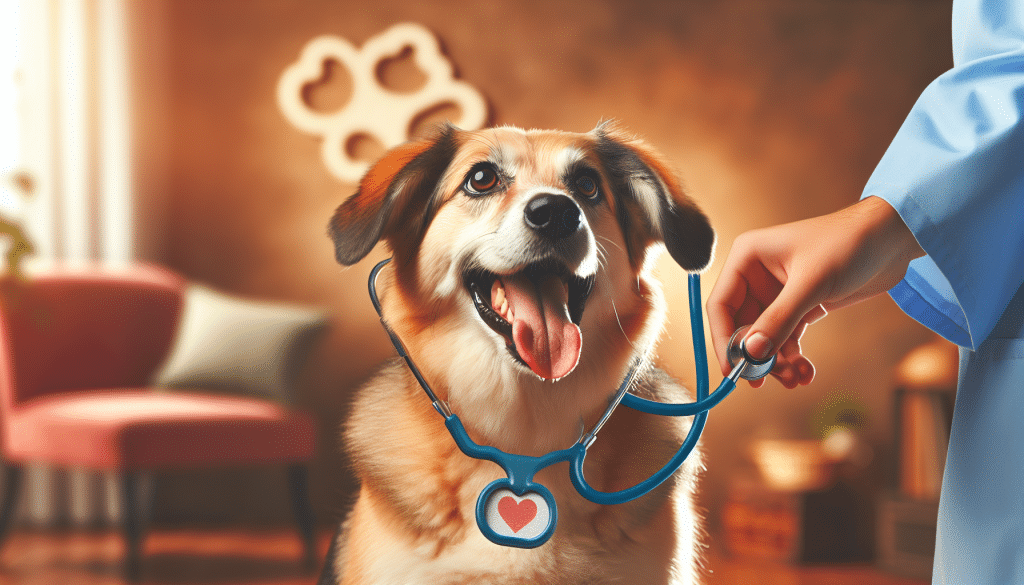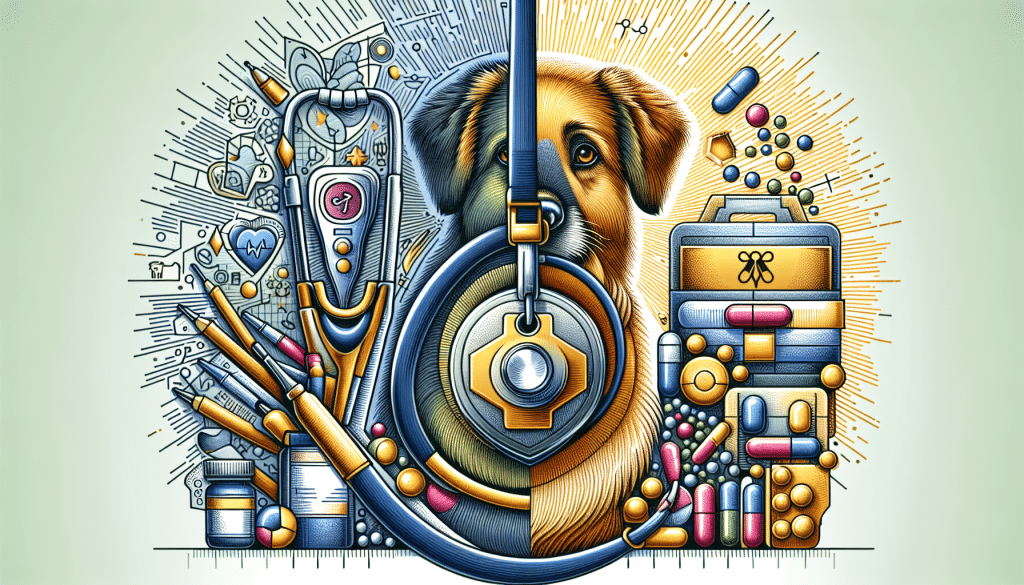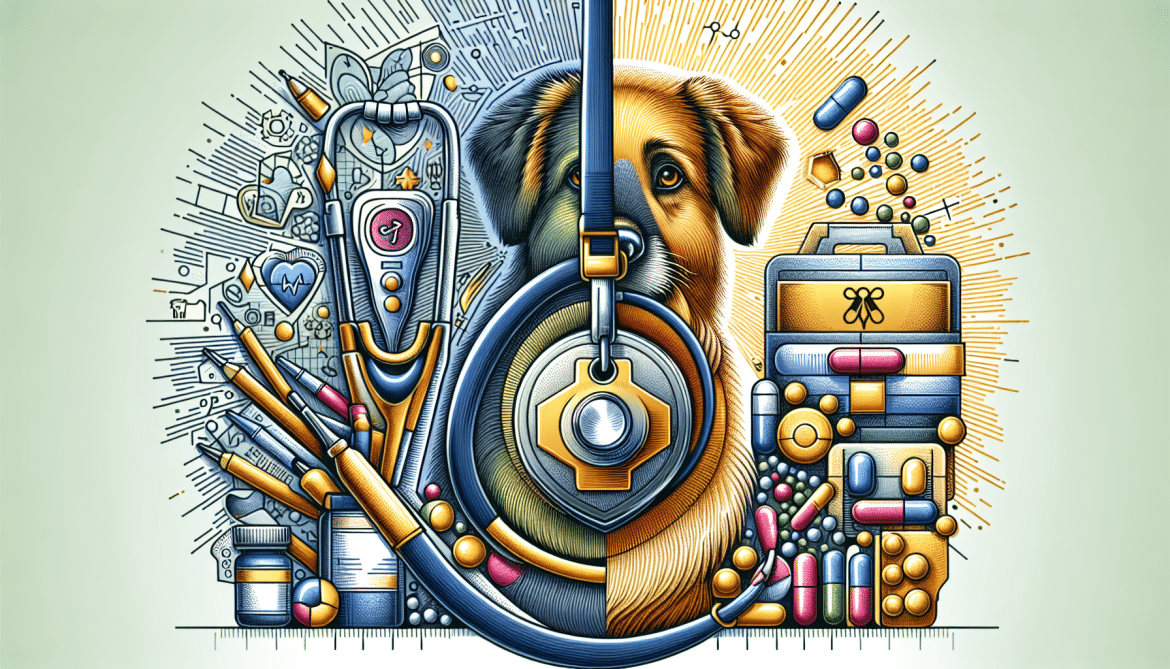Did you know that regular veterinary exams can greatly benefit the health and well-being of your beloved dog? In this article, we will explore the importance of scheduling regular check-ups for your furry friend. From detecting early signs of diseases to providing preventive care, veterinary exams can ensure that your dog stays happy and healthy for years to come. So, let's delve into why these regular visits to the vet are crucial for the overall well-being of your four-legged companion.

This image is property of images.pexels.com.
Early Detection and Prevention
Identifying health issues before they become serious
As a responsible pet owner, one of your primary goals is to ensure the well-being of your furry friend. Early detection of potential health issues is crucial in preventing them from becoming more serious. Regular veterinary check-ups allow trained professionals to thoroughly examine your dog and identify any signs or symptoms that might indicate an underlying health problem. By catching these issues early on, you can take proactive measures to address them and prevent them from developing into more severe conditions.
Preventing the development of chronic conditions
Chronic conditions, such as diabetes, heart disease, and kidney problems, can significantly impact your dog's quality of life. Regular veterinary exams play a vital role in preventing the development of such conditions. During these check-ups, your veterinarian will conduct various tests and screenings to assess your dog's overall health. By keeping track of your pet's vital signs, blood work, and other diagnostic tests, your vet can detect any early indicators of chronic conditions. This allows for timely intervention, which can help manage or even prevent the progression of these conditions.
Vaccinations and preventive care
Vaccinations are an essential part of preventive care for dogs. They protect your furry companion from potentially life-threatening diseases such as rabies, distemper, parvovirus, and hepatitis. Regular veterinary check-ups ensure that your dog is up to date on all necessary vaccinations. Additionally, your veterinarian may recommend preventive measures against parasites like fleas, ticks, and heartworms. These preventive treatments are crucial in safeguarding your dog's health and well-being, as they reduce the risk of your pet contracting these harmful parasites.
Maintaining Optimal Health and Wellness
Regular physical examinations
Just like humans, dogs also require regular physical examinations to maintain optimal health and wellness. During these exams, your veterinarian will conduct a thorough inspection of your dog's body, checking for any abnormalities, lumps, or signs of pain. They will also assess your dog's vital signs, including temperature, heart rate, and respiratory rate. These routine physical examinations provide valuable information about your dog's overall health, allowing your veterinarian to address any concerns promptly.
Monitoring weight and body condition
Weight management is crucial for your dog's overall health and well-being. Obesity in dogs can lead to various health conditions, including joint problems, diabetes, and cardiovascular diseases. Regular veterinary check-ups typically include monitoring your dog's weight and body condition. Your veterinarian can provide guidance on proper nutrition and diet, as well as recommend exercise routines that suit your dog's specific needs. By monitoring your dog's weight and body condition, you can take proactive measures to keep them at a healthy weight, ensuring their long-term well-being.
Diet and nutrition counseling
Proper nutrition is a cornerstone of good health for dogs. During regular veterinary check-ups, your veterinarian can provide valuable guidance and counseling on your dog's diet and nutrition. They will consider your dog's breed, age, activity level, and any pre-existing conditions to recommend the most appropriate diet. Dietary adjustments may be necessary to address specific health concerns or to promote overall wellness. Your veterinarian can also offer advice on portion control, treats, and any necessary supplements to ensure your dog receives a balanced and nutritious diet.
Dental Health
Regular teeth cleanings
Keeping your dog's teeth and gums healthy is essential for their overall well-being. Dental problems can lead to discomfort, difficulty eating, and even more serious health issues if left untreated. Regular teeth cleanings by your veterinarian help remove plaque and tartar buildup, which can contribute to gum disease and tooth decay. Professional cleaning procedures also allow for a thorough examination of your dog's mouth, enabling your veterinarian to identify any dental issues and address them promptly.
Preventing periodontal disease
Periodontal disease is a common condition in dogs that can have severe consequences on their oral health and overall systemic health. Regular dental check-ups, along with recommended cleanings, play a crucial role in preventing periodontal disease. Your veterinarian will evaluate the condition of your dog's gums, teeth, and oral tissues during these check-ups. They can provide you with tips and techniques for maintaining good oral hygiene at home, such as regular brushing and the use of dental-specific products. By taking preventive measures, you can reduce the risk of periodontal disease and its associated complications.
Identifying oral health issues
Regular veterinary dental exams are vital for identifying any potential oral health issues your dog may be facing. During these exams, your veterinarian can detect problems such as fractured teeth, abscesses, oral tumors, or abnormal gum growth. Early detection of these issues allows for timely treatment or referral to a veterinary dentist, ensuring that your dog's oral health is properly maintained. By addressing oral health issues promptly, you can prevent pain and discomfort for your furry companion and maintain their quality of life.
Parasite Prevention and Control
Fleas, ticks, and heartworm prevention
Parasites like fleas, ticks, and heartworms can cause significant discomfort and health problems for your dog. Regular veterinary check-ups play a critical role in preventing these parasites from infesting your furry friend. Your veterinarian can recommend and prescribe appropriate preventive treatments to target these parasites and ensure your dog's well-being. Flea and tick prevention, along with heartworm prevention, are particularly important, as infestations can lead to severe itching, allergies, anemia, and even life-threatening conditions.
Regular parasite screenings
In addition to preventive measures, regular parasite screenings are important for your dog's health. These screenings involve checking your pet's fecal samples for any signs of internal parasites, such as roundworms, hookworms, or whipworms. By conducting regular screenings, your veterinarian can promptly identify and treat any parasitic infections before they cause significant harm to your dog's health. Early detection and treatment are key to preventing complications and ensuring a parasite-free life for your beloved companion.
Treatment options
If your dog does happen to contract a parasite, your veterinarian can provide guidance on the most appropriate treatment options. They may prescribe medications to eliminate the parasites, along with recommendations for environmental management to prevent reinfestation. Your veterinarian will also advise you on follow-up care and preventive measures to minimize the risk of future infestations. By working closely with your veterinarian, you can effectively control and manage parasites, keeping your dog healthy and comfortable.

This image is property of images.pexels.com.
Behavioral Assessment and Training
Evaluation of behavioral concerns
Behavioral issues can significantly impact the relationship between you and your dog. Regular veterinary check-ups offer an excellent opportunity to discuss any concerns you may have regarding your dog's behavior. Your veterinarian can assess your dog's behavior, discuss any changes you have observed, and determine if there are any underlying medical issues contributing to the behavior. By evaluating behavioral concerns, your veterinarian can provide appropriate guidance or refer you to a certified dog trainer or behaviorist for further assistance.
Training recommendations
Whether you have a new puppy or an adult dog, training is essential for a well-behaved and sociable companion. During regular veterinary check-ups, you can seek recommendations and advice from your veterinarian regarding training techniques and strategies. Your veterinarian can provide guidance on basic obedience training as well as addressing specific behavioral issues that may be of concern. By following their recommendations, you can establish a strong bond with your dog and ensure they are well-mannered members of your household.
Addressing anxiety and aggression
Anxiety and aggression are common behavioral issues that many dogs may exhibit. These behaviors can stem from various factors, including fear, lack of socialization, or underlying medical conditions. Regular veterinary check-ups allow for the evaluation of your dog's behavior, including any anxiety or aggression concerns. Your veterinarian can recommend appropriate behavioral modification techniques, training programs, or even medication if necessary. By addressing these issues head-on and seeking professional guidance, you can help your dog overcome anxiety or aggression, creating a safe and harmonious environment for both you and your pet.
Senior Dog Care
Early detection of age-related conditions
As your dog enters their senior years, their health needs may change. Regular veterinary check-ups become even more crucial during this stage of their life. Senior dogs are more prone to certain age-related conditions, such as arthritis, cognitive decline, and organ dysfunction. By scheduling regular check-ups, your veterinarian can detect any early signs of these conditions and tailor a wellness plan specifically for your senior dog. Early detection allows for intervention and management strategies that can improve your dog's comfort and quality of life as they age.
Managing arthritis and mobility issues
Arthritis is a common condition in senior dogs and can significantly impact their mobility and overall well-being. Regular veterinary check-ups allow for the assessment of your dog's joint health and the implementation of appropriate interventions. Your veterinarian may recommend joint supplements, pain management strategies, or physical therapy modalities to alleviate discomfort and improve mobility. By actively managing arthritis and mobility issues, you can enhance your senior dog's quality of life, allowing them to remain active and happy for as long as possible.
Tailored senior dog wellness plans
Senior dogs have unique health requirements that differ from those of younger dogs. Regular veterinary check-ups for senior dogs involve comprehensive examinations and the establishment of tailored wellness plans. These plans may include specialized diets, additional diagnostic tests, and specific monitoring methods to address common age-related concerns. By implementing a personalized wellness plan, your veterinarian can help optimize your senior dog's health and well-being, ensuring they enjoy their golden years to the fullest.

This image is property of images.pexels.com.
Reproductive Health
Consultation on breeding and reproductive planning
If you are considering breeding your dog, regular veterinary consultations are essential for ensuring optimal reproductive health. Your veterinarian can provide guidance on the breeding process, including timing, fertility evaluation, and genetic considerations. They can also advise on reproductive planning to maximize the chances of successful breeding and healthy pregnancies. By consulting with your veterinarian, you can make informed decisions regarding your dog's reproductive health, ensuring the well-being of both the dam and potential offspring.
Preventing or managing reproductive disorders
Reproductive disorders can have significant implications for both male and female dogs. Regular veterinary check-ups allow for the early detection and prevention or management of such disorders. Your veterinarian can perform routine exams and diagnostic tests to identify any reproductive issues. By addressing these concerns promptly, your veterinarian can recommend appropriate treatment options or interventions to ensure your dog's reproductive health remains optimal.
Monitoring pregnancies and performing C-sections
If your dog becomes pregnant, regular veterinary check-ups are crucial for monitoring the progress of the pregnancy and ensuring a safe delivery. Your veterinarian can perform ultrasounds, blood tests, and physical examinations to assess the health of the mother and the developing puppies. In some cases, a cesarean section (C-section) may be necessary to ensure the well-being of both the mother and the puppies. Regular veterinary care during pregnancy helps ensure a smooth and successful outcome, minimizing potential risks and complications.
Spaying and Neutering
Benefits of spaying and neutering
Spaying and neutering offer numerous benefits for both dogs and their owners. These procedures involve the surgical removal of the reproductive organs and are typically performed by veterinarians. Spaying your female dog can prevent uterine infections, ovarian cancer, and unwanted litters of puppies. Neutering your male dog can reduce the risk of testicular cancer, prostate problems, and certain behavioral issues. Additionally, spaying and neutering can help control the pet population and reduce the number of stray or abandoned dogs.
Preventing unwanted litters
Unplanned or unwanted litters contribute to the growing population of stray and homeless dogs. Spaying or neutering your dog is a responsible choice that helps prevent these unwanted litters. By removing the reproductive organs, you eliminate the risk of accidental pregnancies and ensure that your dog cannot contribute to overpopulation. Preventing unwanted litters through spaying and neutering is a proactive way to promote responsible pet ownership and help reduce the burden on animal shelters and rescue organizations.
Reducing the risk of certain cancers
Spaying or neutering your dog can have significant health benefits, including reducing the risk of certain cancers. Spaying a female dog helps prevent uterine infections and significantly lowers the risk of mammary gland tumors, especially if the procedure is done before the first heat cycle. Neutering a male dog eliminates the risk of testicular cancer and reduces the chance of prostate problems. By opting for spaying or neutering, you can provide your dog with long-term health benefits, preventing potentially life-threatening conditions.

Emergency Preparedness
Emergency contact information
Emergencies can happen at any time, and being prepared is crucial for the well-being of your dog. Regular veterinary check-ups provide an opportunity to update your emergency contact information. Make sure your veterinarian has your current contact numbers and knows how to reach you in case of an emergency. Additionally, note down your veterinarian's emergency contact information so that you can quickly seek veterinary assistance if needed.
First aid kits and training
Having a well-stocked first aid kit specifically tailored for your dog can be a lifesaver in emergency situations. During regular veterinary check-ups, consider discussing first aid kit essentials with your veterinarian. They can provide guidance on what items to include, such as bandages, antiseptics, and medications. Additionally, consider enrolling in a pet first aid and CPR course to learn essential skills that can help you provide immediate care to your dog in emergency situations.
Knowing when to seek immediate veterinary care
During regular veterinary check-ups, your veterinarian can educate you about important signs and symptoms that warrant immediate veterinary care. They can teach you how to recognize signs of distress, such as difficulty breathing, severe pain, trauma, or significant changes in behavior. By being aware of these signs and knowing when to seek immediate veterinary care, you can potentially save your dog's life. Regular conversations with your veterinarian provide you with the knowledge and confidence to make informed decisions in emergency situations.
Building a Strong Relationship
Open communication and trust
Regular veterinary check-ups are not only about the physical health of your dog but also about building a strong relationship with your veterinarian. Establishing open communication and trust is vital in ensuring the well-being of your furry companion. By attending regular check-ups, you have the opportunity to discuss any concerns or questions you may have about your dog's health, behavior, or overall well-being. Your veterinarian can provide personalized recommendations, answer your queries, and guide you in making informed decisions for your dog's care.
Establishing a medical history
Regular veterinary check-ups help establish and maintain a comprehensive medical history for your dog. This medical history provides valuable information for your veterinarian and enables them to track your dog's health over time. By documenting important details, such as vaccination records, previous illnesses, surgeries, and medications, your veterinarian can make informed decisions about your dog's health care. This comprehensive medical history is particularly valuable in emergencies or when consulting with specialists, as it ensures that your dog receives the most appropriate and effective treatment.
Access to accurate health records
In addition to establishing a medical history, regular veterinary check-ups ensure that you have accurate and up-to-date health records for your dog. These records include vaccination certificates, diagnostic test results, and any treatments or procedures performed. Accurate health records are essential for various purposes, including boarding, traveling, or enrolling your dog in training programs. By attending check-ups and obtaining these records, you can easily provide proof of your dog's health and ensure compliance with any necessary requirements.
In conclusion, regular veterinary check-ups play a crucial role in maintaining the health and well-being of your beloved dog. From early detection and prevention of health issues to addressing behavioral concerns and ensuring proper reproductive health, these check-ups provide a comprehensive approach to canine care. By prioritizing regular veterinary visits, you demonstrate your commitment to your dog's health, fostering a strong bond and ensuring a long, happy, and healthy life together.




1 comment
[…] of the steps involved in teaching your puppy to drop items on command while highlighting the benefits of having a dog that knows how to do […]
Comments are closed.